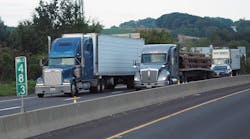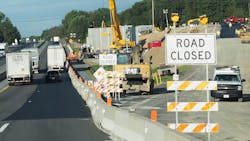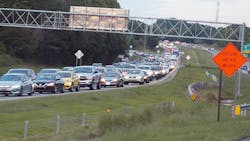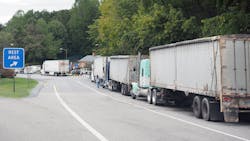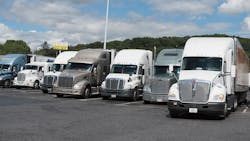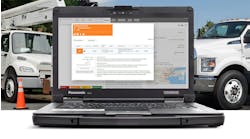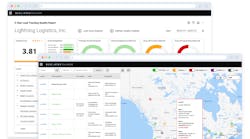With today marking four months since full enforcement of the electronic logging device (ELD) mandate, a number of truck drivers still say there are problems with ELDs in use and the federal Hours of Service (HOS) rules that are their foundation.
This has never been much of a honeymoon. After one of our recent articles noted that large percentages of drivers and fleets don't believe ELDs are good for the transportation industry or are making trucks safer, we got another big dose or three of feedback.
Despite the Federal Motor Carrier Safety Administration's (FMCSA) adjustment of more leeway in what can be counted as personal conveyance—a driving status that can allow a truck driver to operate a commercial motor vehicle outside of the HOS on-duty drive time constraints—scores of drivers say more must be done.
FMCSA helped with one big problem many truck drivers complained of: running out of available drive time while delivering or picking up a load and then being told to leave the premises. The agency said a driver in that situation can operate the truck to the nearest safe parking space to take the necessary off-duty time and rest.
Delays, driver pay, ELDs at odds
After hearing from a number of drivers, a significant point emerges. As the system has evolved, notably with paper logs as the standard over many years, most drivers are paid by the mile. Some fleets have changed that to hourly pay, but it's a minority. So if drivers aren't moving, for the most part, they aren't earning money.
That seems to be forcing drivers to butt heads frequently with the HOS time limits in today's reality of delays that truck drivers face. And it boils down primarily to several situations, including getting stuck in traffic and resoundingly, being held up at shippers and receivers "for hours" with a load.
Sometimes an observer sees it best. One truck driver's wife said she goes out with her husband maybe one week each month and watches as he faces problems finding parking or getting stuck waiting to load or unload.
"Why is it fair to have ELDs count off your driving time when you're sitting at a shipper or receiver? The truck driver is not driving, so why should it be counted against driving time?" she wrote. "Driving hours should just mean that—the time you're driving."
"It's also unfair to require drivers to stop at the nearest safe place to park when if they drove half an hour more they could be home," she added. "Try pushing shipping and receiving places to load in a timely manner instead of leaving truckers sitting for hours."
A veteran female driver summed up many comments we received well. "There are so many variables we have to deal with that have been made much worse" with ELDs and strictly enforced HOS rules, she contended.
"We spend half our time not moving on the road working for free—that has not changed. We sit at loading and unloading docks for free. That has not changed. The larger companies may be doing better, but the small business owner is still stuck working for free," the driver emphasized.
"And if you try for detention pay [from the shipper or receiver], they refuse and find someone else. That is what we have been facing for years and continues," she said. "Parking has been a major problem for years; time lost at shippers and receivers has been a problem for years. Fixing those things will go a long way in making things safer."
Another driver's stark comments stood out: "I have personally started my day at midnight to get some hours back, then driven for hours on three hours of sleep," he wrote.
"Am I a safer driver because of ELDs? No. But I am legal."
Drivers said some of the same things over and over. "The 14-hour clock [overall on-duty time limit in the HOS rules] should stop if you are not moving, taking a break, or are at a dock doing nothing," one driver urged.
Said another, also along those lines: "The problem is not the ELD; I've used one for six years. The problem is the HOS rules. Dock time counts against the 14-hour clock. It forces unsafe driving practices. The 30-minute break does the same. The HOS rules need to be reformed."
'Unsafe'
Overwhelmingly, the comment Fleet Owner heard most is that even with more flexibility to find safe parking if they run out of available drive time, truck drivers are "racing against the clock" as well in many other situations as ELDs log their hours.
"In one instance just last night, I felt sleepy. But my on-duty clock had begun to tick down. Due to the Hours of Service rules, I was compelled to keep driving to get in the hours I needed, hit the checkpoint, and deliver on time," a driver commented. "So I drove another three hours. There's nothing safe about that."
"The FMCSA has put a lot of race car drivers in trucks with the ELDs," quipped another. "Drivers are trying to beat the clock wherever they may be heading. There are now more careless drivers, there's more road rage, there are more accidents. Where is the safety in that?"
Many drivers who sent comments were those that are quite valuable to fleets and trucking companies—those who are well-experienced, with years of good service left to offer.
"I have been driving over the road for 16 years," one driver said. "I have never felt like I was under the gun to rush before like I do now. In the past few months, my 14-hour clock catches me more. This is due to delays at shippers and consignees taking their sweet time to load or unload.
"Also causing this is the high volume of construction work zones in every state that causes long delays, and another issue is slow clean-up of accidents, which causes backups for miles," he continued.
Another driver had similar comments, pointing specifically to mileage-based pay as causing grief. "Since ELDs have become mandatory, I feel like I'm racing against the clock more now than ever. It is very rare these days that I get my 10 to 11 hours of driving in," he noted.
"Since I'm paid by the mile, my paychecks have become more unpredictable. Where I used to be more cautious in many areas such as construction zones and metropolitan cities and towns, I have found myself and others trying to push harder to get through," he added. "I believe ELDs have caused more safety issues than before."
Some specific types of drivers also reported problems since ELDs. "I'm in the car-hauling industry, and ELDs have done nothing but hurt us," one contended.
"Instead of loading cars as you wish, not passing out in the extreme heat, now we are speeding through these yards like we are on a drag strip. We are trying to load and go so we can make our deliveries before the dealers stop accepting them," he wrote.
"Because we all are in a rush," the driver added, "we all are taking bigger risks by cutting cars and other truckers off because we don't have extra minutes to spare in a lot of cases. It's making us rush, which means mistakes."
Still another truck driver's comments were telling, pointing to the real change from paper to electronic logs. "ELDs have forced today's drivers to try to make up for delays at shippers, receivers, and construction and other traffic by pushing too hard to make up the time. When was the last time you saw a trucker stop to help a motorist?" he wrote.
"After a delay, the old-timers would continue on in a safe, courteous manner and make the adjustment with a ballpoint pen," he continued, implying that paper logs simply could be adjusted, allowing de-facto flexibility. "But today, the logging device sits next to the driver as he speeds through construction zones and heavy traffic watching his remaining minutes tick away."
You don't understand trucking
"The real problem is the people who make the rules don't understand the way we work or the business of trucking," wrote one truck driver. A feeling that there's a disconnect between government regulators and truck drivers "in real life out on the road" also cropped up in feedback we received.
"I would challenge FMCSA to spend a week in the winter with a driver and learn what trucking really is," a female driver stressed. "We are being squeezed from all sides, and no one really knows what a challenge it is to try to follow all the rules they keep throwing at us while still having to work half our time for free and trying to put food on the table."
"You can't have someone devise a program that has no practical knowledge of what drivers have to deal with on a day-to-day basis," another driver accused, tacitly pointing to FMCSA regulators.
And yes, there was some disgruntled fire and brimstone. As has been stated (and shouted) in truck driver forums this year, some drivers called out trucking associations lobbying Washington; many owner-operators decried "big trucking companies" and what they referred to in some cases as "corporate greed."
"The American Trucking Assns. does not represent the American truck driver," argued one such driver. "The ATA only represents the large trucking companies. The government really needs to start listening to the drivers."
Get off my back
Truck drivers often are the sort of people who don't like office work or bosses hanging over them and enjoy the open freedom of the road. That, or at least the promise of it, is classically cited as a large part of what led drivers to trucking in the first place—along with the ability to earn a good living at the same time.
So it should come as no surprise that a number of drivers who wrote to Fleet Owner also said they feel like ELDs effectively are "big brother" or an unwanted government imposition.
"I don't want the heel of government on the back of my neck," a driver said. "That is how I feel about ELDs: the heel of government on my neck."
In a previous article, I asked, "Are ELDs helping?" One trucker's reply: "Yes—they are helping to get great, safe drivers off the road who just don't like being babysat."
"I've been a truck driver for almost 42 years now, and I'm going to retire as soon as I turn 67," another driver stated. "In the time I've been driving, we went from almost no regulation to overregulation."
A positive note
With all the complaints raised, some drivers actually had better things to say about ELDs, if roundabout.
"On the bright side, ELDs have made the driver shortage worse, so everyone is paying more to get freight hauled and drivers make more money," a driver commented. "The money has needed to go up ever since deregulation."
"ELDs have contributed to driver shortages as well as freight rates going through the roof. The flipside is that driver wages are finally getting to where they should have been years ago," another driver echoed a similar sentiment.
"I do believe ELDs are showing that shippers and consignees are taking way too long to load or unload a truck," a driver stated, expressing hope the devices will lead shippers and others to reform those practices.
"Rates have improved, which is good," still another noted. "I get more rest, which is good, but not always necessary."
